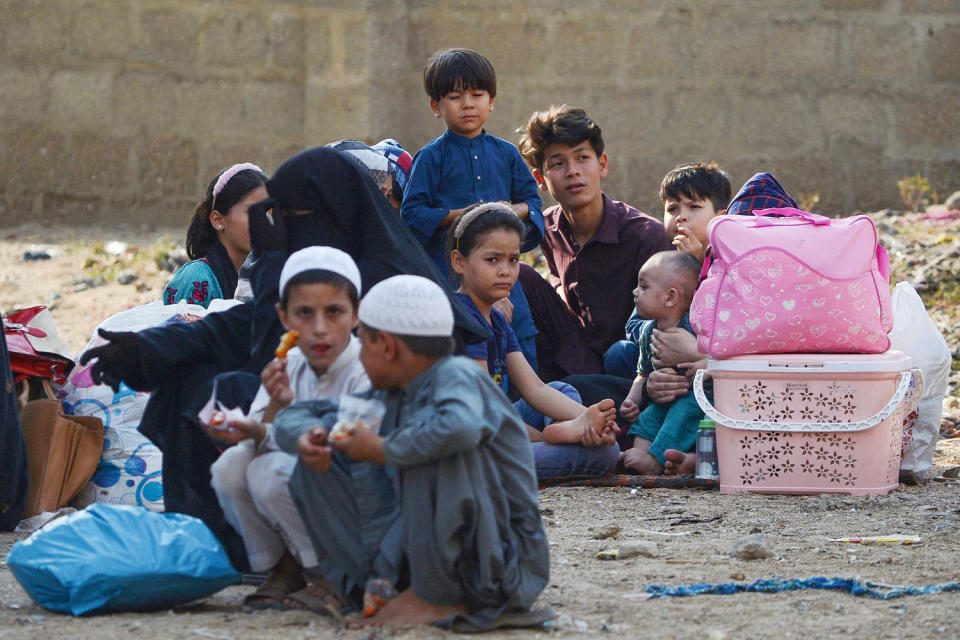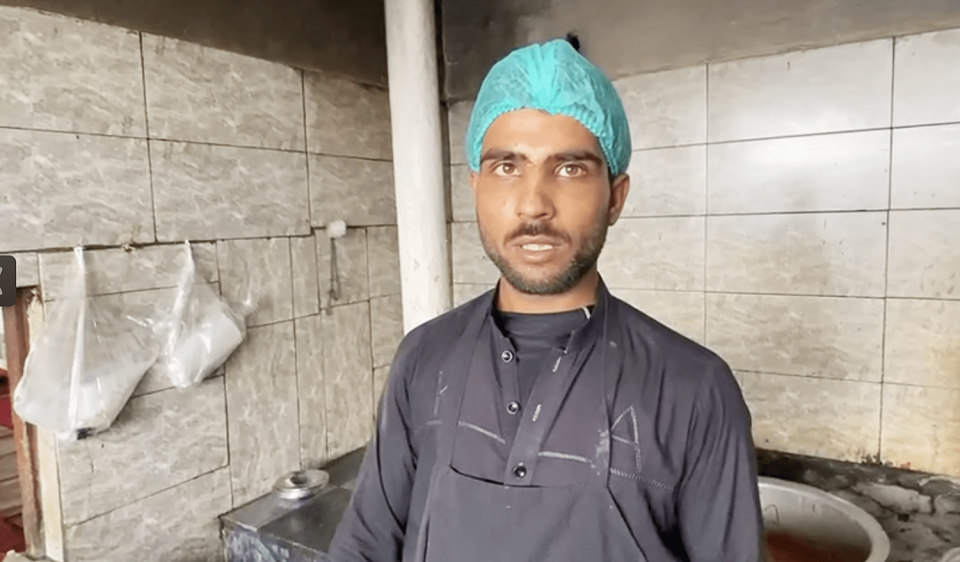Hundreds of thousands of Afghan migrants face deportation from Pakistan
PESHAWAR, Pakistan — Hundreds of thousands of undocumented Afghan migrants are facing deportation from Pakistan to the Taliban-ruled country that some of them have never even visited.
In a surprise announcement last month, the Pakistani government said it would arrest and deport an estimated 1.7 million unregistered or undocumented foreigners starting Nov. 1. Though Pakistan says the crackdown is not aimed at any particular nationality, most of the foreigners living there are from neighboring Afghanistan.
The United Nations’ human rights office said the move could give rise to a “human rights catastrophe,” as families could be separated and some of those sent back face possible arrest and torture in Afghanistan.
Pakistani officials have accused Afghan nationals of being involved in militant attacks, smuggling and other crimes, which the Afghan government denies.
“Regardless of whether they are playing a good or bad role in society, our system has no way of identifying these individuals,” interim Prime Minister Anwaar-ul-Haq Kakar said in Lahore on Monday.
On Wednesday, dozens of Afghans were already being rounded up and deported after the expiration of an Oct. 31 deadline to leave.
“Today, we said goodbye to 64 Afghan nationals as they began their journey back home,” interim Interior Minister Sarfraz Bugti wrote in a post on X, accompanied by video footage. “This action is a testament to Pakistan’s determination to repatriate any individuals residing in the country without proper documentation.”
Today, we said goodbye to 64 Afghan nationals as they began their journey back home. This action is a testament to Pakistan's determination to repatriate any individuals residing in the country without proper documentation. pic.twitter.com/2PB9BjFKTA
— Senator Sarfraz Bugti (@PakSarfrazbugti) November 1, 2023
Fearing arrest, 140,000 Afghans have left the country in recent weeks, according to the Pakistani Interior Ministry. On Tuesday, thousands of vehicles loaded with household goods were moving slowly toward the border in Peshawar, a city in northwest Pakistan.
Many Afghans thought they would never go back and are worried about what will happen when they do.
“Afghanistan is our country, but I was born and raised in Pakistan,” Ilyas Khan, 37, told NBC News. “There is an uncertain future waiting for us in Afghanistan.”
Pakistan says the 1.4 million Afghans registered as refugees will not be affected. Those who are arrested will be sent to one of multiple deportation centers set up around the country, but no one will be mistreated, officials said.
“We will provide them with food, take care of their medical needs, but at the same time we highly recommend voluntary return,” Bugti told reporters last week.
Kakar said those who get deported would not necessarily be barred from Pakistan indefinitely, and that they should get proper visas.
“If they want to come back for educational purposes or business purposes or any other purpose, we will facilitate that process, but we want a regulated process,” he said.

Afghanistan, which has called Pakistan’s plan “unacceptable” and asked for the deadline to be extended, has set up a high commission to assist forcibly returned Afghan refugees with temporary accommodations and other services.
“We are here to welcome our Afghan brothers and sisters in their motherland,” Taliban spokesman Zabihullah Mujahid said. “We will utilize all our resources to facilitate them in their rehabilitation.”
Activists, journalists, artists and people who worked as officials or soldiers for Afghanistan’s former U.S.-backed government are at particular risk, U.N. officials say. So are women and girls, whose rights to education, work and free movement have been rapidly rolled back under the Taliban.
“For an overwhelming majority of them, living and studying in Pakistan may be their only chance of gaining a formal education,” Amnesty International said in a statement Tuesday, calling on the international community to help Pakistan with the cost of hosting Afghan refugees.
More than 100 former U.S. leaders, diplomats and others also objected to the planned deportations of Afghans, thousands of whom fled Taliban rule and have been waiting for more than two years in Pakistan for U.S. visas.
“This decision would only cause chaos and make a bad situation worse,” they wrote in an open letter. “We urge Pakistan to work with us to resettle qualifying individuals in the U.S., not send them back to Afghanistan where they face certain doom.”
There are more than 2 million undocumented Afghans living in Pakistan, according to the U.N., at least 600,000 of whom arrived after the Taliban regained power in August 2021 amid the withdrawal of U.S. and NATO forces. Others fled while Afghanistan was occupied by the then-Soviet Union from 1979 to 1989 or after the U.S. invaded Afghanistan following the Sept. 11, 2001, terrorist attacks.
The majority of those more recent arrivals are undocumented, according to Qaiser Khan Afridi, a spokesperson for the U.N. High Commissioner for Refugees. If they return to Afghanistan, he said, “there are serious potential threats to their freedom and safety.”
Many also face major financial losses, since the Pakistani government is limiting the amount of cash migrants can take out of the country.
Habib Jan, 24, who works as a cook at a restaurant, said he and his father were both born in Peshawar and had never been to Afghanistan.
“I married a Pakistani woman and had two children with her,” he said. According to Pakistani law, however, a foreign man who marries a citizen isn’t entitled to citizenship, though a woman from another country is eligible if she marries a Pakistani man.

“We don’t have a single piece of land in Afghanistan, and the second major problem is my wife doesn’t want to go to Afghanistan,” Jan said.
Musafar Khan, who has a business selling fruits and vegetables with his brothers, said neither he nor any of his 11 siblings, all born in Peshawar, have ever been to their family's native village in Afghanistan’s eastern Nangarhar province. His family has proper documentation and does not plan to leave Pakistan, he said, but they worry they might be forced to, nonetheless.
“Pakistan is a remarkable country and the people are extremely welcoming and friendly,” Khan, 35, said. “We don’t even have a house in Afghanistan, so where would we be living if sent back?”
He added that his family has always considered Pakistan their home. Even so, he said, they decided to sell their house in case they get deported and need money.
“We have all the relevant documents to stay here, but we sold our house in Peshawar at a throwaway price as anything can happen to us,” Khan said.
Undocumented migrants in Pakistan are being deported as Afghanistan faces widespread hunger that is likely to get worse as winter approaches. The country is also still dealing with the aftermath of a series of earthquakes in October in the province of Herat, in which women and children made up more than 90% of deaths.
Tensions between Pakistan and Afghanistan, which share a border of about 1,600 miles, have increased in the past two years over a surge in attacks on Pakistani security forces by the Tehreek-e-Taliban Pakistan (TTP), or Pakistani Taliban. Pakistan accuses Afghanistan of harboring Islamist militants from the group, which is separate from the Afghan Taliban but has a similar ideology.
Days before Pakistan announced the deportations, suicide bombings at two mosques in provinces bordering Afghanistan killed about 60 people. The TTP denied it was responsible.
This article was originally published on NBCNews.com

